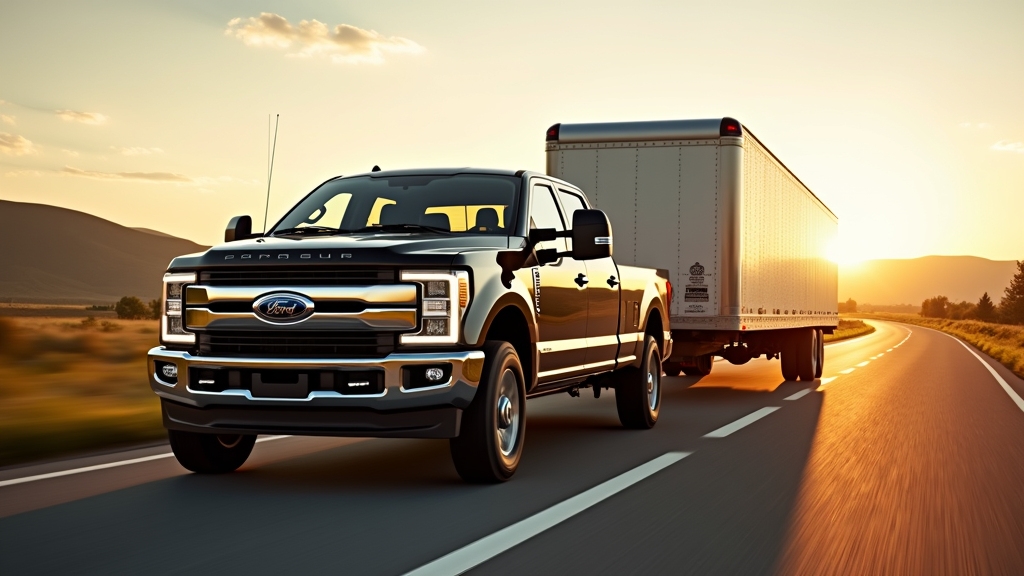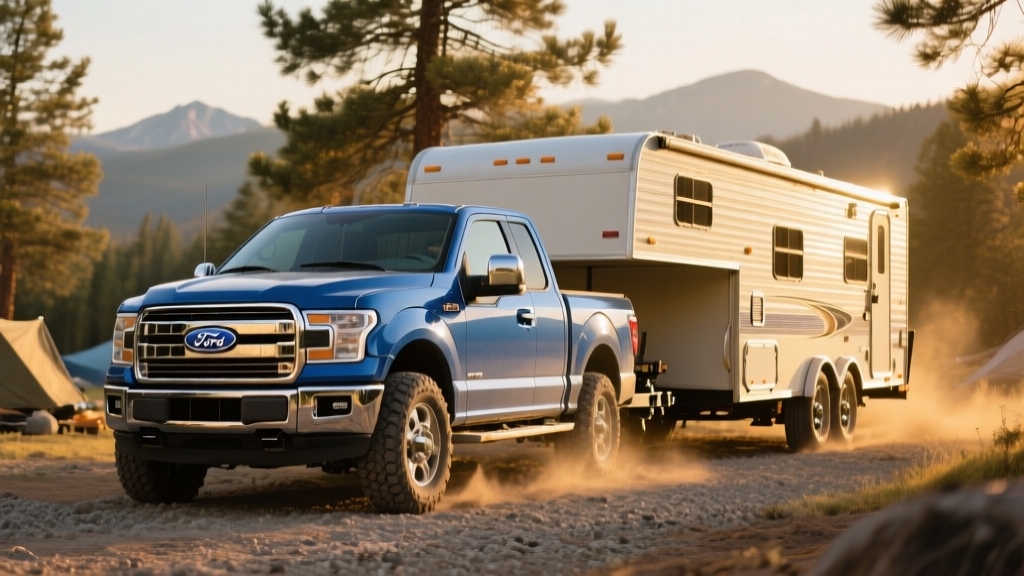You can tow a 5th wheel with a Ford F-150 if it’s properly equipped. Newer models, especially the 2025 F-150 with the 3.5L EcoBoost V6 and Tow/Haul Package, can handle up to 13,500 pounds.
Keep in mind, payload and tongue weight limits are critical for safety and performance, and bed length affects hitch compatibility. Picking the right engine and hitch setup guarantees you tow confidently.
Exploring these details will help you optimize your towing experience.
Key Takeaways
- The 2025 Ford F-150 with a 3.5L EcoBoost V6 can tow up to 13,500 lbs of 5th wheel trailer when properly configured.
- A factory 5th-wheel hitch prep package and compatible hitch are required for safe 5th wheel towing with the F-150.
- Tongue weight should be 10-15% of trailer weight and kept within the truck’s payload limits for stability and control.
- Longer bed lengths (6.5 ft or more) improve 5th wheel hitch installation and maneuverability compared to short beds.
- Always verify your specific F-150’s GVWR, GCWR, and towing package limits before towing a 5th wheel trailer.
Understanding the 5th Wheel Towing Capacity of the Ford F-150

When you consider towing a 5th wheel trailer with a Ford F-150, understanding the truck’s towing capacity is essential for safe and effective hauling. The 2025 F-150 with the 3.5L EcoBoost V6, SuperCrew cab, 6.5-ft box, 4×4, and Tow/Haul Package tops out at 13,500 lbs max towing.
The 5.0L V8 closely follows at 12,900 lbs, while the hybrid PowerBoost offers 11,200 lbs. Lower EcoBoost engines range from 8,200 to 8,400 lbs. Achieving these numbers requires proper configurations, including the Tow/Haul Package and Max Tow Axle.
Ford also offers advanced features like Pro Trailer Backup Assist™ to simplify trailer maneuvering. Using certified towing equipment ensures safety and reliability when hauling heavy trailers.
Remember, towing capacity varies with options and payload, so always confirm your specific setup. Exceeding capacity risks safety and vehicle damage, so precise knowledge is vital before hitching a 5th wheel.
Key Truck Configurations for 5th Wheel Compatibility
To tow a 5th wheel with your F-150, you’ll need the right hitch packages designed for secure bed mounting and load distribution. Using an anti-sway hitch can greatly improve towing stability and safety, especially for larger trailers.
Bed size plays an essential role; longer beds like the 6.5- or 8-foot options offer better clearance and compatibility with most 5th-wheel trailers.
Additionally, understanding your truck’s payload and tongue weight capacities guarantees you match the setup to your towing demands safely and effectively. It is important to note that the F-150 is classified as a 3/4 ton truck with a payload capacity around 1820 lbs, which includes fuel, passengers, cargo, and hitch weight.
Required Hitch Packages
Although selecting the right hitch package depends on your F-150’s specific configuration, installing the factory 5th-Wheel and Gooseneck Hitch Prep Package is essential for proper 5th wheel compatibility. This package provides factory-installed puck system mounting points in the bed, allowing easy, secure installation of OEM or aftermarket hitches designed for the F-150.
Keep in mind, bed length limits availability, with only 8-foot beds fully supporting this prep package without requiring specialized sliding hitches. Many F-150 5th wheel and Gooseneck hitches are designed to fold out of the way when not in use, maximizing bed usability.
You’ll also need a hitch rated for your truck’s towing capacity, often up to 30,000 lbs gross trailer weight and 5,000+ lbs pin weight. Choosing Ford Genuine Accessory 5th-wheel hitches preserves warranty coverage and guarantees the hitch matches your truck’s axle ratio, engine, and suspension specifications for safe, efficient towing.
Bed Size Considerations
Selecting the right hitch package sets the foundation for towing, but understanding your F-150’s bed size is equally important for 5th wheel compatibility. Proper tire choice enhances safety and performance, ensuring a reliable towing experience.
If your F-150 has a bed shorter than 6 feet, especially with SuperCrew cabs, you’ll face clearance challenges during tight turns. Tires designed for heavy loads ensure stability when towing, which is crucial for short-bed setups. Standard fixed hitches often won’t fit safely, and slider hitches may not resolve cab contact risks.
Underbed mounting systems like the REESE Max Duty offer a practical alternative, preserving bed space while improving clearance and stability. For 2004-2008 Ford F150 New Body Style models with beds as short as 5’4″ or 5’6″, the Signature Series mounting kit 30064 combined with a Sidewinder is the only manufacturer-recommended setup to ensure compatibility.
Longer beds of 6.5 feet or more simplify hitch installation since fixed leg-mounted hitches fit without clearance issues. Ultimately, your bed length determines hitch type and mounting method, directly affecting safe maneuverability and ease of 5th wheel towing with your F-150.
Maintaining proper inflation of trailer tires is also key to safe towing and tire longevity.
Payload and Tongue Weight
When you plan to tow a 5th wheel trailer with your F-150, understanding payload and tongue weight is essential for safe and effective performance. Payload capacity ranges from about 1,990 to 3,270 lbs., depending on engine and configuration.
The 3.5L EcoBoost and 5.0L V8 variants offer top payloads near 3,230-3,270 lbs. Choosing tires with the correct load rating is also crucial to handle the weight safely. Tongue weight, typically 15-25% of your trailer’s total weight, must stay within your truck’s payload limit to avoid suspension and braking issues.
Cab style, drivetrain, and suspension packages affect these limits, so you must consider them carefully. Consult the vehicle’s GVWR and GAWR ratings to ensure your load does not exceed safe limits. Equipped with a proper 5th wheel hitch, your F-150 can distribute tongue weight safely.
Impact of Engine Types on Towing Performance
Because engine type directly influences towing capability, understanding their differences helps you choose the best F-150 for hauling 5th-wheel trailers. Higher horsepower and torque improve towing capacity, with turbocharged EcoBoost V6 engines offering excellent power and efficiency.
Diesel engines provide superior low-end torque and durability, while electric powertrains deliver instant torque but have range limits. Your choice affects towing smoothness, fuel consumption, and trailer control. Additionally, selecting the right tire specifications matching your trailer’s requirements is crucial to ensure safe towing and handling.
| Engine Type | Max Towing Capacity | Torque (lb-ft) |
|---|---|---|
| 3.5L EcoBoost V6 | 13,200 lbs | 470 |
| 5.0L Ti-VCT V8 | 11,500 lbs | 400 |
| 3.0L Turbo Diesel V6 | 11,500 lbs | 440 |
| F-150 Lightning (EV) | 10,000 lbs | 775 |
Payload Limits and Tongue Weight Considerations

When towing a 5th wheel with your F-150, you need to account for both payload capacity and tongue weight carefully. The trailer’s tongue weight directly reduces your available payload, so managing it within your truck’s limits is essential for safety and performance.
Understanding these factors helps you maintain control and avoid overloading your vehicle. Additionally, using the appropriate engine oil viscosity for your truck can ensure optimal engine performance under towing stress.
Payload Capacity Impact
Although the F-150 offers impressive towing capabilities, you must carefully consider its payload capacity, as it directly affects how safely and effectively you can tow a 5th wheel trailer. Payload includes passengers, cargo, and the trailer’s tongue weight pressing on the rear axle.
Exceeding this capacity reduces towing efficiency and risks overloading the suspension, brakes, and tires. Payload varies by engine and trim—from roughly 1,990 lbs in base V6s to over 3,200 lbs with the 3.5L EcoBoost or 5.0L V8. Remember, installing a 5th-wheel hitch adds weight, lowering your available payload for cargo and passengers.
Properly balancing payload and tongue weight guarantees vehicle stability, preserves handling, and prevents safety hazards. It’s essential to match your F-150’s specific payload limits with your trailer’s tongue weight before towing.
Additionally, just as selecting the right RV water pump depends on flow rates and pressure compatibility, understanding your truck’s payload helps ensure optimal towing performance and safety.
Managing Tongue Weight
Since tongue weight directly impacts your F-150’s handling and safety, managing it within the truck’s payload limits is critical for towing a 5th wheel trailer. Tongue weight, the downward force on your hitch receiver, should be about 10-15% of the trailer’s loaded weight to maintain stability.
Exceeding your F-150’s specific tongue weight capacity—usually between 700 and 1,350 lbs depending on model and equipment—risks overloading the rear axle, compromising braking and control. You must factor in passengers and cargo inside the truck to avoid surpassing the gross vehicle weight rating (GVWR).
Use properly rated 5th wheel hitches and adjust hitch height to distribute tongue weight correctly. Regularly measure tongue weight with onboard scales or smart systems to ensure safe towing and prevent sway or suspension damage. Additionally, applying protective coatings such as UV resistant wax on trailer surfaces can help maintain the trailer’s integrity during frequent towing.
Required Equipment for Safe 5th Wheel Towing
To tow a 5th wheel trailer safely with your F-150, you need specific equipment designed to handle the unique demands of this setup. Proper gear guarantees stability, control, and compliance with weight limits.
- 5th Wheel Hitch with Compatible Mounting. Install a hitch that fits your truck bed, typically requiring the Trailer Tow Package (53A) or Max Trailer Tow Package (53C). Guarantee professional installation for ideal alignment and turning clearance.
- Trailer Brake Controller and Wiring Harness. These components integrate with your truck’s systems to control trailer brakes and lights, enhancing safety during towing.
- Heavy-Duty Cooling Systems and Tires. Use upgraded coolers for engine and transmission plus heavy-load rated tires to manage heat and stress under load.
Choosing a fully articulating hitch with shock absorption features can significantly reduce chucking and improve your towing comfort on rough roads.
Legal and Safety Guidelines for Towing 5th Wheel Trailers
When towing a 5th wheel trailer with your F-150, you must strictly follow legal weight limits and safety regulations to guarantee compliance and prevent hazards. Confirm the combined weight of your truck, passengers, cargo, and trailer doesn’t exceed the Gross Vehicle Weight Rating (GVWR) or Gross Combined Weight Rating (GCWR) specified by Ford.
Use a properly rated 5th wheel hitch installed per manufacturer guidelines, and verify your trailer has the required braking system. You must carry valid licensing appropriate for your combined vehicle weight, and register your trailer with insurance coverage reflecting your towing setup.
Always secure safety chains, breakaway systems, and functional lighting. Regularly inspect your equipment and adhere to speed and distance restrictions to maintain safe and legal towing on public roads. Additionally, accurately measuring the trailer’s tongue weight with a tongue weight scale helps ensure balanced load distribution and safer towing.
Comparing 5th Wheel Towing Ratings Across Model Years
Although towing capacities have generally increased over the years, you’ll find notable differences in 5th wheel ratings across various F-150 model years. For instance, early 2010s models typically maxed out under 10,000 lbs, especially with EcoBoost or V6 engines.
Early 2010s F-150s generally maxed 5th wheel towing under 10,000 lbs, notably with EcoBoost or V6 engines. By contrast, newer models, particularly from the mid to late 2010s onward, benefit from stronger EcoBoost engines and towing packages that push limits beyond 13,000 lbs.
When comparing, consider:
- Engine and drivetrain variations. 3.5L EcoBoost models often offer the highest towing ratings.
- Bed length and truck configuration. Shorter beds limit compatible trailer sizes.
- Tow/Haul and Max Tow packages. These are essential for achieving maximum capacities.
Practical Tips for Managing Heavy Trailer Loads
Since handling heavy 5th wheel trailer loads demands both strength and control, you’ll need the right equipment and techniques to guarantee safety and performance. Start by using a properly rated 5th wheel hitch and ensure your F-150 has the Tow/Haul package.
Distribute cargo evenly to maintain balance and stay within your truck’s GVWR and GAWR to prevent axle overload. Employ tow/haul mode, maintain slower speeds, and increase following distances for better control. Always perform thorough pre-trip inspections, focusing on tire pressure, brake systems, and hitch security.
Owner Experiences and Common Towing Challenges
Understanding owner experiences with F-150 towing reveals how different models and configurations affect your 5th-wheel performance. Owners report that engine choice, payload limits, and hitch setup critically influence towing success and safety.
For example, a 3.5L EcoBoost V6 with a Tow/Haul Package offers up to 13,500 lbs capacity, while less powerful engines restrict towing ability. Common challenges include managing payload and tongue weight, controlling trailer sway, and preventing transmission overheating on hills.
Key owner insights include:
- Proper hitch installation and bed compatibility are essential for stability.
- Monitoring brake systems and tire wear prevents safety hazards.
- Electronic aids like sway control improve handling and reduce fatigue.
Frequently Asked Questions
How Does Weather Affect 5th Wheel Towing With an F-150?
Weather affects your 5th wheel towing with an F-150 by altering traction, braking, and stability. Rain, snow, and ice reduce grip, forcing you to drive slower and increase following distances.
Wind gusts can sway the trailer, challenging your control. Cold can dull brake response and engine efficiency, while heat stresses cooling and brakes. You’ll need to adjust brake settings, use tow/haul mode, and maintain tires to stay safe in changing conditions.
Can I Tow a 5th Wheel With an F-150 Electric Bed Extender?
Yes, you can tow a 5th wheel with an F-150 electric bed extender, but you need to make sure the extender doesn’t interfere with hitch installation or trailer clearance. The extender reduces bed length slightly, so verify compatibility with your 5th wheel hitch and trailer size.
Professional installation is recommended to maintain towing safety. Always check for secure mounting and confirm the extender’s stability under towing stresses before hitting the road.
What Maintenance Is Unique to 5th Wheel Towing Setups?
You’ve got to treat 5th wheel towing maintenance like it’s the crown jewel of your rig’s care. Unique tasks include regularly inspecting the hitch for cracks or wear, lubricating the hitch plate and locking mechanism, and checking the kingpin on the trailer for damage.
You also must tighten all hitch mount hardware and verify the locking system fully engages before each trip to avoid catastrophic failure during towing.
Are There Aftermarket Hitches Better Than Ford’s OEM Options?
Yes, many aftermarket hitches outperform Ford’s OEM options. You’ll find brands like B&W and Andersen offer stronger, more durable components with features such as adjustable height, sliding rails, and superior vibration dampening.
While OEM hitches integrate seamlessly with Ford’s electronics and warranty, aftermarket hitches provide greater versatility, especially for custom setups or non-standard bed sizes. Installation may require extra effort and cost.
How Does Altitude Impact F-150 5th Wheel Towing Capacity?
Altitude reduces your F-150’s engine power and torque due to thinner air, cutting its effective 5th wheel towing capacity. You’ll notice increased fuel consumption and higher risk of overheating transmission and engine components.
To tow safely, you must lower trailer weight limits, adjust tire pressures, and drive more cautiously on steep grades. Using models with turbocharged engines and advanced cooling can help, but always consult your Owner’s Manual for altitude-specific towing guidelines.
Optimizing Your Ford F-150 for the Best Towing Experience
When it comes to towing a 5th wheel with your Ford F-150, knowing your truck’s limits is like reading the map before a journey. You avoid getting lost or stuck. While some F-150 configurations handle moderate 5th wheel trailers well, payload and tongue weight restrictions are vital.
Equip your truck properly and follow safety guidelines to guarantee a smooth ride. Understanding these factors puts you in the driver’s seat for towing success every time.



